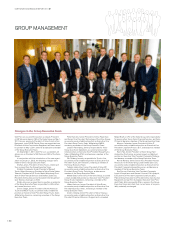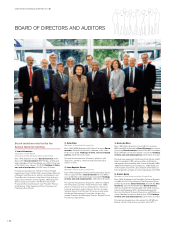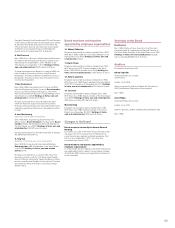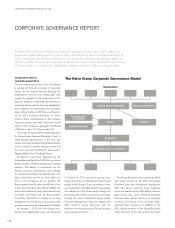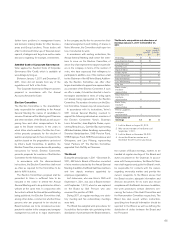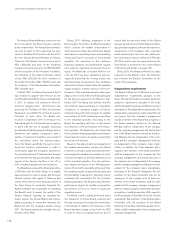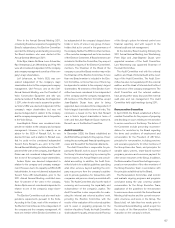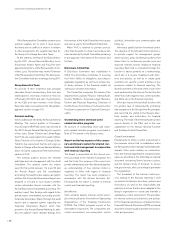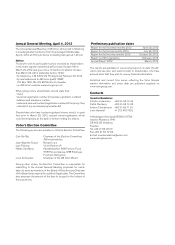Volvo 2011 Annual Report Download - page 163
Download and view the complete annual report
Please find page 163 of the 2011 Volvo annual report below. You can navigate through the pages in the report by either clicking on the pages listed below, or by using the keyword search tool below to find specific information within the annual report.Risk assessment
Risks relating to financial reporting are evaluated
and monitored by the Board through the Audit
Committee inter alia through identifying what
types of risks that typically could be considered
as material and where they would typically
occur. The annual evaluation of internal control
activities conducted by the Internal Control and
Internal Audit functions, are based on a risk-
based model. The evaluation of the risk that
errors will appear in the financial reporting is
based on a number of criteria. Complex
accounting principles can, for example, mean
that the financial reporting risks being inaccu-
rate for those posts that are covered by such
principles. Valuation of a particular asset or lia-
bility according to various evaluation criteria
can also constitute a risk. The same is true for
complex and/or changing business circum-
stances.
Control activities
In addition to the Board of AB Volvo and its
Audit Committee, the management groups and
other decision-making bodies in the business
areas, Group functions and Group companies
constitute the overall supervisory body.
Several control activities are applied in the
ongoing business processes to ensure that
potential errors or deviations in the financial
reporting are prevented, discovered and cor-
rected. Control activities range from review of
outcome results in management group meet-
ings to specific reconciliation of accounts and
analysis of the ongoing processes for financial
reporting. Responsibility for ensuring that control
activities in the financial processes are appro-
priate and in accordance with the Group’s policies
and instructions are compiled in the Group’s
shared service center. Within the framework for
the financial reporting, they are also responsible
for ensuring that authority structures are
designed so that one person cannot perform an
activity and then perform the control of the
same activity. Control activities within IT security
and maintenance are a key part of Volvo’s internal
control over financial reporting.
Information and communication
Policies and instructions relating to the financial
reporting are updated and communicated on a
regular basis from management to all affected
employees. In addition, there are a number of
committees and networks within Volvo that
serve as forums for information and discussions
regarding issues relating to the financial reporting
and application of internal rules. Included in
these committees and networks are represent-
atives from the business areas and the Group’s
staff units who are responsible for financial
reporting. Work in these committees and net-
works is aimed, among other things, at ensuring
a uniform application of the Group’s policies,
principles and instructions for the financial
reporting and at identifying and communicating
shortcomings and areas of improvement in the
processes for financial reporting.
Follow-up
Ongoing responsibility for follow-up rests with
the business areas’ management groups and
accounting and controller functions. In addition,
the Internal Audit and the Internal Control func-
tions conduct review and follow-up activities in
accordance with what is described in the intro-
duction of this report. More specifically, the
Internal Control function runs and coordinates
evaluation activities through the “Volvo Group
Internal Control program”, which gives a sys-
tematic way of evaluating the quality and effec-
tiveness of the internal control over financial
reporting on a yearly basis. A yearly evaluation
plan is settled and presented to the Audit Com-
mittee. This evaluation program comprises three
main areas:
1. Control policies and guidelines: Self-assessment
procedure carried out by management teams
at business area and Group function levels as
well as local company level. Main areas eval-
uated are the adherence to the Group’s
financial directives and policies found in FPP
along with The Volvo Way and the Group’s
Code of Conduct.
2. Process controls at transaction levels: Pro-
cesses related to the financial reporting are
evaluated by testing of specific routines and
controls based upon the Group’s framework
for internal control over financial reporting,
VICS – “Volvo Internal Control Standards”.
The framework focus on the financial reporting
areas deemed to have a relatively higher risk
for potential errors because e.g. complex
accounting principles, complex or changed
business operations etc.
3. General IT controls: Processes for main-
tenance, development and access manage-
ment of financial applications are evaluated
by testing of routines and controls.
The results of the evaluation activities are
reported to the Group management and the
Audit Committee.
Göteborg, February 23, 2012
AB Volvo (publ)
Board of Directors
Auditor’s report on the Corporate
Governance Report
To the annual meeting of the shareholders in AB
Volvo, corporate identity number 556012-5790
It is the Board of Directors who is responsible
for the Corporate Governance Report for the
year 2011 on pages 150–159 and that it has
been prepared in accordance with the Annual
Accounts Act.
We have read the Corporate Governance
Report and based on that reading and our
knowledge of the company and the group we
believe that we have a sufficient basis for our
opinions. This means that our statutory exami-
nation of the Corporate Governance Report is
different and substantially less in scope than an
audit conducted in accordance with Interna-
tional Standards on Auditing and generally
accepted auditing standards in Sweden.
In our opinion, the Corporate Governance
Report has been prepared and its statutory
content is consistent with the annual accounts
and the consolidated accounts
Göteborg, February 23, 2012
PricewaterhouseCoopers AB
Göran Tidström
Authorized Public
Accountant
Lead Auditor
Johan Rippe
Authorized Public
Accountant



